Learning Plan: Seed Germination, Space Art & Capillary Action K12
VerifiedAdded on 2023/06/05
|14
|4453
|398
Practical Assignment
AI Summary
This assignment features a series of learning plans designed for K12 education, focusing on topics in biological and chemical science. The first plan details a lesson on seed germination, emphasizing its importance for environmental sustainability and incorporating hands-on activities for children to understand the process. The second plan explores space art, aiming to enhance children's understanding of celestial objects and their movements through creative expression. The third lesson plan covers capillary action, explaining the movement of water in porous materials and its relevance in chemical science. Each plan includes learning objectives, teaching strategies, resource requirements, and assessment methods, providing a comprehensive guide for educators. Discover more educational resources and solved assignments on Desklib.
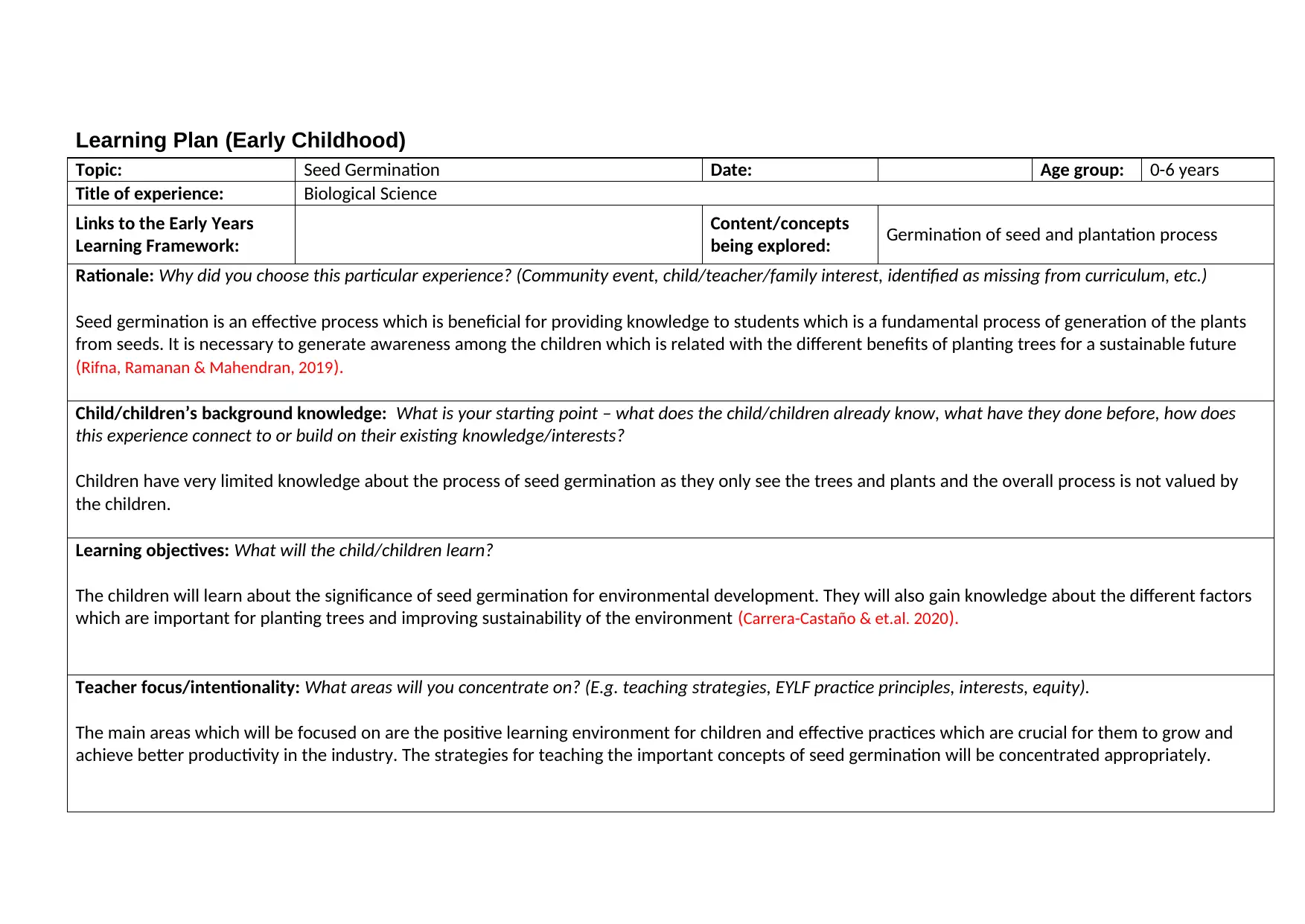
Learning Plan (Early Childhood)
Topic: Seed Germination Date: Age group: 0-6 years
Title of experience: Biological Science
Links to the Early Years
Learning Framework:
Content/concepts
being explored: Germination of seed and plantation process
Rationale: Why did you choose this particular experience? (Community event, child/teacher/family interest, identified as missing from curriculum, etc.)
Seed germination is an effective process which is beneficial for providing knowledge to students which is a fundamental process of generation of the plants
from seeds. It is necessary to generate awareness among the children which is related with the different benefits of planting trees for a sustainable future
(Rifna, Ramanan & Mahendran, 2019).
Child/children’s background knowledge: What is your starting point – what does the child/children already know, what have they done before, how does
this experience connect to or build on their existing knowledge/interests?
Children have very limited knowledge about the process of seed germination as they only see the trees and plants and the overall process is not valued by
the children.
Learning objectives: What will the child/children learn?
The children will learn about the significance of seed germination for environmental development. They will also gain knowledge about the different factors
which are important for planting trees and improving sustainability of the environment (Carrera-Castaño & et.al. 2020).
Teacher focus/intentionality: What areas will you concentrate on? (E.g. teaching strategies, EYLF practice principles, interests, equity).
The main areas which will be focused on are the positive learning environment for children and effective practices which are crucial for them to grow and
achieve better productivity in the industry. The strategies for teaching the important concepts of seed germination will be concentrated appropriately.
Topic: Seed Germination Date: Age group: 0-6 years
Title of experience: Biological Science
Links to the Early Years
Learning Framework:
Content/concepts
being explored: Germination of seed and plantation process
Rationale: Why did you choose this particular experience? (Community event, child/teacher/family interest, identified as missing from curriculum, etc.)
Seed germination is an effective process which is beneficial for providing knowledge to students which is a fundamental process of generation of the plants
from seeds. It is necessary to generate awareness among the children which is related with the different benefits of planting trees for a sustainable future
(Rifna, Ramanan & Mahendran, 2019).
Child/children’s background knowledge: What is your starting point – what does the child/children already know, what have they done before, how does
this experience connect to or build on their existing knowledge/interests?
Children have very limited knowledge about the process of seed germination as they only see the trees and plants and the overall process is not valued by
the children.
Learning objectives: What will the child/children learn?
The children will learn about the significance of seed germination for environmental development. They will also gain knowledge about the different factors
which are important for planting trees and improving sustainability of the environment (Carrera-Castaño & et.al. 2020).
Teacher focus/intentionality: What areas will you concentrate on? (E.g. teaching strategies, EYLF practice principles, interests, equity).
The main areas which will be focused on are the positive learning environment for children and effective practices which are crucial for them to grow and
achieve better productivity in the industry. The strategies for teaching the important concepts of seed germination will be concentrated appropriately.
Paraphrase This Document
Need a fresh take? Get an instant paraphrase of this document with our AI Paraphraser
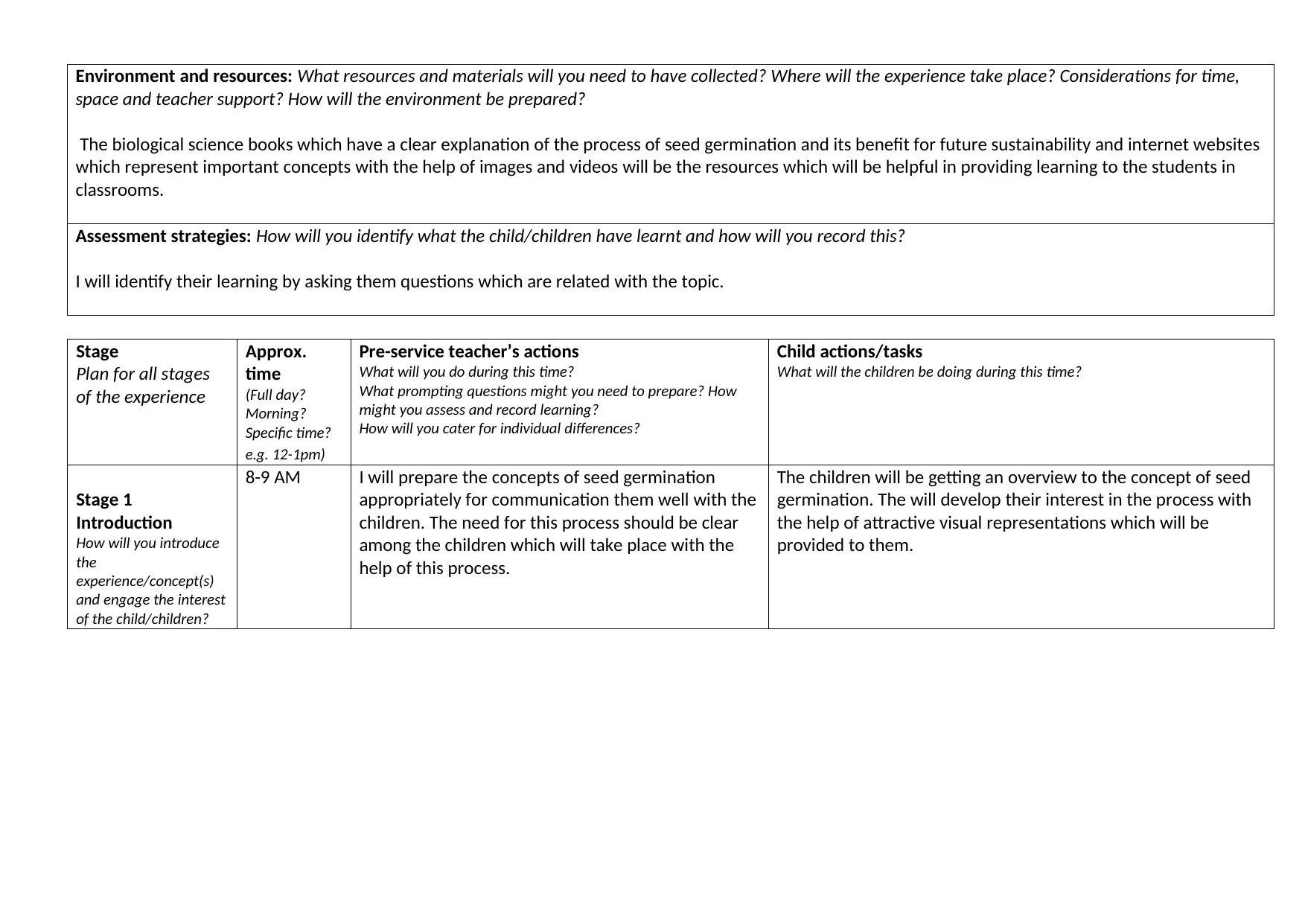
Environment and resources: What resources and materials will you need to have collected? Where will the experience take place? Considerations for time,
space and teacher support? How will the environment be prepared?
The biological science books which have a clear explanation of the process of seed germination and its benefit for future sustainability and internet websites
which represent important concepts with the help of images and videos will be the resources which will be helpful in providing learning to the students in
classrooms.
Assessment strategies: How will you identify what the child/children have learnt and how will you record this?
I will identify their learning by asking them questions which are related with the topic.
Stage
Plan for all stages
of the experience
Approx.
time
(Full day?
Morning?
Specific time?
e.g. 12-1pm)
Pre-service teacher’s actions
What will you do during this time?
What prompting questions might you need to prepare? How
might you assess and record learning?
How will you cater for individual differences?
Child actions/tasks
What will the children be doing during this time?
Stage 1
Introduction
How will you introduce
the
experience/concept(s)
and engage the interest
of the child/children?
8-9 AM I will prepare the concepts of seed germination
appropriately for communication them well with the
children. The need for this process should be clear
among the children which will take place with the
help of this process.
The children will be getting an overview to the concept of seed
germination. The will develop their interest in the process with
the help of attractive visual representations which will be
provided to them.
space and teacher support? How will the environment be prepared?
The biological science books which have a clear explanation of the process of seed germination and its benefit for future sustainability and internet websites
which represent important concepts with the help of images and videos will be the resources which will be helpful in providing learning to the students in
classrooms.
Assessment strategies: How will you identify what the child/children have learnt and how will you record this?
I will identify their learning by asking them questions which are related with the topic.
Stage
Plan for all stages
of the experience
Approx.
time
(Full day?
Morning?
Specific time?
e.g. 12-1pm)
Pre-service teacher’s actions
What will you do during this time?
What prompting questions might you need to prepare? How
might you assess and record learning?
How will you cater for individual differences?
Child actions/tasks
What will the children be doing during this time?
Stage 1
Introduction
How will you introduce
the
experience/concept(s)
and engage the interest
of the child/children?
8-9 AM I will prepare the concepts of seed germination
appropriately for communication them well with the
children. The need for this process should be clear
among the children which will take place with the
help of this process.
The children will be getting an overview to the concept of seed
germination. The will develop their interest in the process with
the help of attractive visual representations which will be
provided to them.
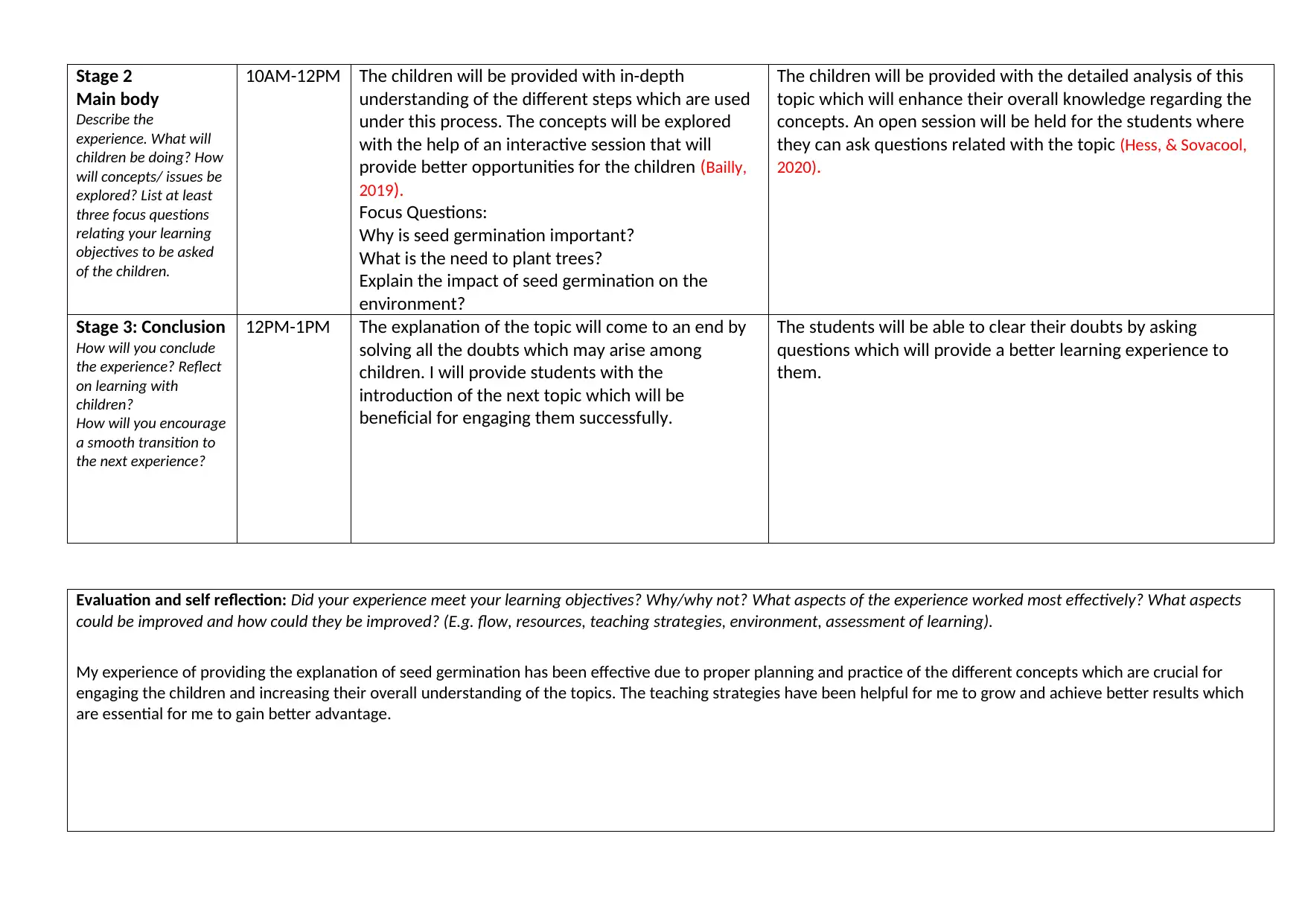
Stage 2
Main body
Describe the
experience. What will
children be doing? How
will concepts/ issues be
explored? List at least
three focus questions
relating your learning
objectives to be asked
of the children.
10AM-12PM The children will be provided with in-depth
understanding of the different steps which are used
under this process. The concepts will be explored
with the help of an interactive session that will
provide better opportunities for the children (Bailly,
2019).
Focus Questions:
Why is seed germination important?
What is the need to plant trees?
Explain the impact of seed germination on the
environment?
The children will be provided with the detailed analysis of this
topic which will enhance their overall knowledge regarding the
concepts. An open session will be held for the students where
they can ask questions related with the topic (Hess, & Sovacool,
2020).
Stage 3: Conclusion
How will you conclude
the experience? Reflect
on learning with
children?
How will you encourage
a smooth transition to
the next experience?
12PM-1PM The explanation of the topic will come to an end by
solving all the doubts which may arise among
children. I will provide students with the
introduction of the next topic which will be
beneficial for engaging them successfully.
The students will be able to clear their doubts by asking
questions which will provide a better learning experience to
them.
Evaluation and self reflection: Did your experience meet your learning objectives? Why/why not? What aspects of the experience worked most effectively? What aspects
could be improved and how could they be improved? (E.g. flow, resources, teaching strategies, environment, assessment of learning).
My experience of providing the explanation of seed germination has been effective due to proper planning and practice of the different concepts which are crucial for
engaging the children and increasing their overall understanding of the topics. The teaching strategies have been helpful for me to grow and achieve better results which
are essential for me to gain better advantage.
Main body
Describe the
experience. What will
children be doing? How
will concepts/ issues be
explored? List at least
three focus questions
relating your learning
objectives to be asked
of the children.
10AM-12PM The children will be provided with in-depth
understanding of the different steps which are used
under this process. The concepts will be explored
with the help of an interactive session that will
provide better opportunities for the children (Bailly,
2019).
Focus Questions:
Why is seed germination important?
What is the need to plant trees?
Explain the impact of seed germination on the
environment?
The children will be provided with the detailed analysis of this
topic which will enhance their overall knowledge regarding the
concepts. An open session will be held for the students where
they can ask questions related with the topic (Hess, & Sovacool,
2020).
Stage 3: Conclusion
How will you conclude
the experience? Reflect
on learning with
children?
How will you encourage
a smooth transition to
the next experience?
12PM-1PM The explanation of the topic will come to an end by
solving all the doubts which may arise among
children. I will provide students with the
introduction of the next topic which will be
beneficial for engaging them successfully.
The students will be able to clear their doubts by asking
questions which will provide a better learning experience to
them.
Evaluation and self reflection: Did your experience meet your learning objectives? Why/why not? What aspects of the experience worked most effectively? What aspects
could be improved and how could they be improved? (E.g. flow, resources, teaching strategies, environment, assessment of learning).
My experience of providing the explanation of seed germination has been effective due to proper planning and practice of the different concepts which are crucial for
engaging the children and increasing their overall understanding of the topics. The teaching strategies have been helpful for me to grow and achieve better results which
are essential for me to gain better advantage.
⊘ This is a preview!⊘
Do you want full access?
Subscribe today to unlock all pages.

Trusted by 1+ million students worldwide
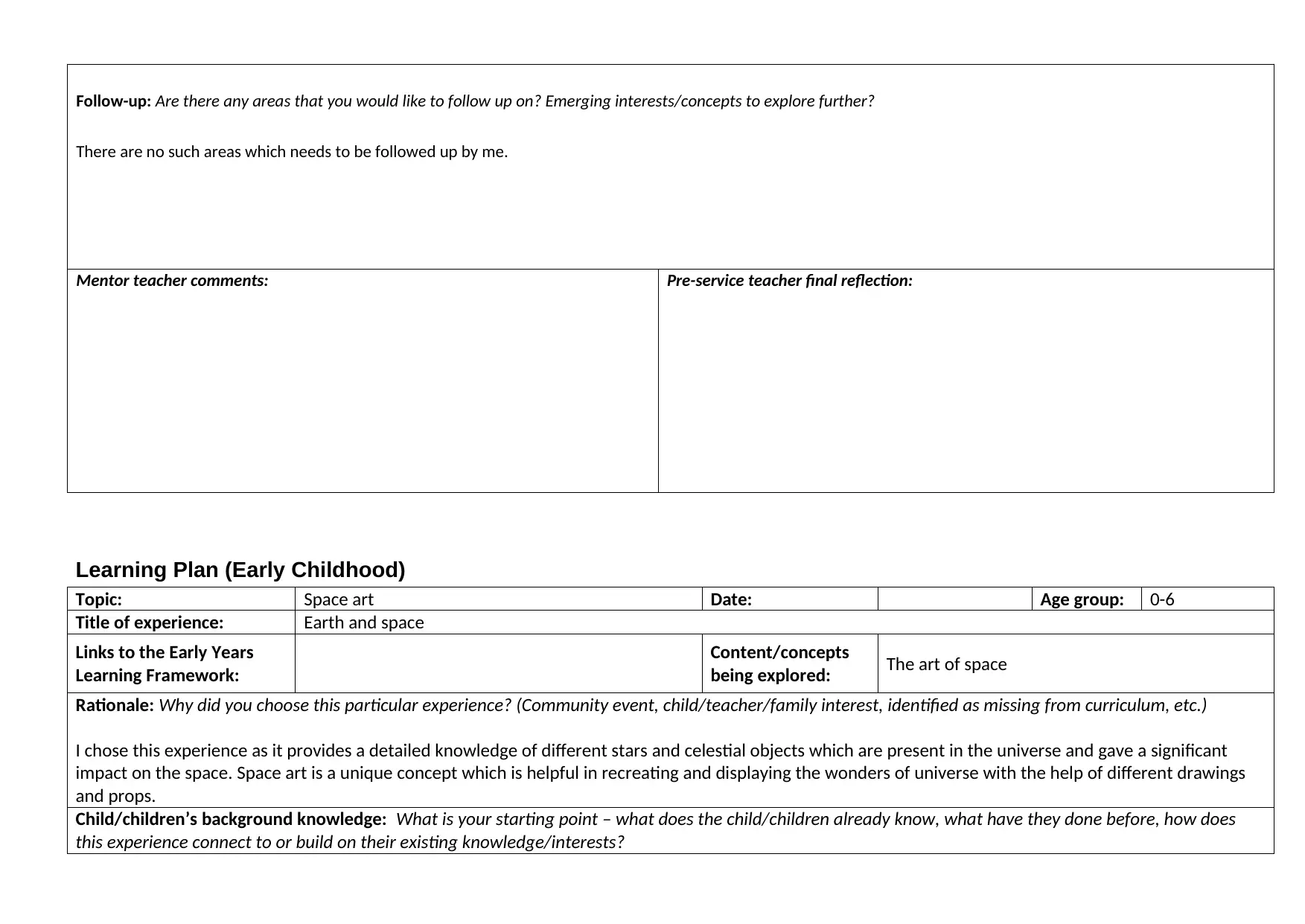
Follow-up: Are there any areas that you would like to follow up on? Emerging interests/concepts to explore further?
There are no such areas which needs to be followed up by me.
Mentor teacher comments: Pre-service teacher final reflection:
Learning Plan (Early Childhood)
Topic: Space art Date: Age group: 0-6
Title of experience: Earth and space
Links to the Early Years
Learning Framework:
Content/concepts
being explored: The art of space
Rationale: Why did you choose this particular experience? (Community event, child/teacher/family interest, identified as missing from curriculum, etc.)
I chose this experience as it provides a detailed knowledge of different stars and celestial objects which are present in the universe and gave a significant
impact on the space. Space art is a unique concept which is helpful in recreating and displaying the wonders of universe with the help of different drawings
and props.
Child/children’s background knowledge: What is your starting point – what does the child/children already know, what have they done before, how does
this experience connect to or build on their existing knowledge/interests?
There are no such areas which needs to be followed up by me.
Mentor teacher comments: Pre-service teacher final reflection:
Learning Plan (Early Childhood)
Topic: Space art Date: Age group: 0-6
Title of experience: Earth and space
Links to the Early Years
Learning Framework:
Content/concepts
being explored: The art of space
Rationale: Why did you choose this particular experience? (Community event, child/teacher/family interest, identified as missing from curriculum, etc.)
I chose this experience as it provides a detailed knowledge of different stars and celestial objects which are present in the universe and gave a significant
impact on the space. Space art is a unique concept which is helpful in recreating and displaying the wonders of universe with the help of different drawings
and props.
Child/children’s background knowledge: What is your starting point – what does the child/children already know, what have they done before, how does
this experience connect to or build on their existing knowledge/interests?
Paraphrase This Document
Need a fresh take? Get an instant paraphrase of this document with our AI Paraphraser
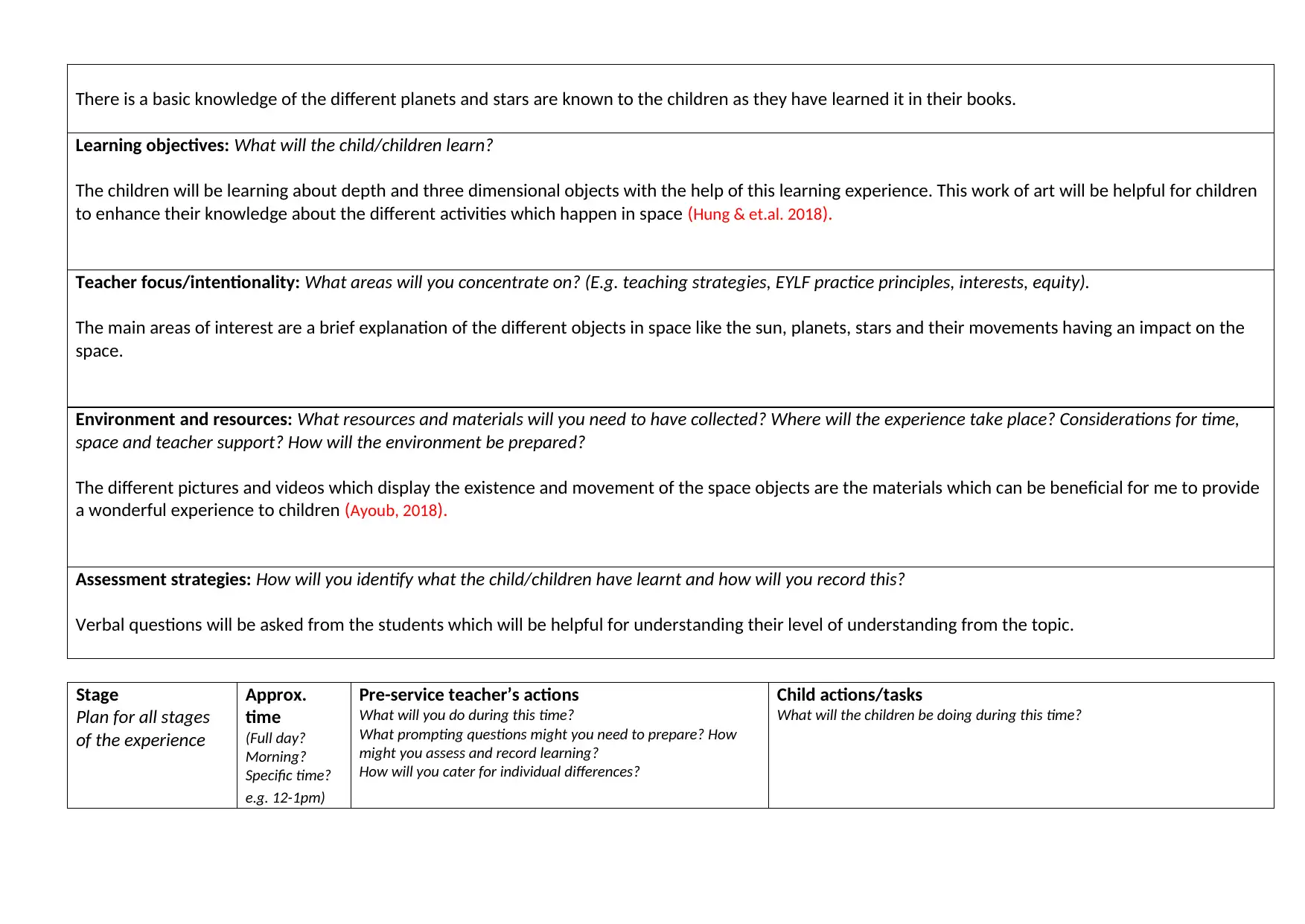
There is a basic knowledge of the different planets and stars are known to the children as they have learned it in their books.
Learning objectives: What will the child/children learn?
The children will be learning about depth and three dimensional objects with the help of this learning experience. This work of art will be helpful for children
to enhance their knowledge about the different activities which happen in space (Hung & et.al. 2018).
Teacher focus/intentionality: What areas will you concentrate on? (E.g. teaching strategies, EYLF practice principles, interests, equity).
The main areas of interest are a brief explanation of the different objects in space like the sun, planets, stars and their movements having an impact on the
space.
Environment and resources: What resources and materials will you need to have collected? Where will the experience take place? Considerations for time,
space and teacher support? How will the environment be prepared?
The different pictures and videos which display the existence and movement of the space objects are the materials which can be beneficial for me to provide
a wonderful experience to children (Ayoub, 2018).
Assessment strategies: How will you identify what the child/children have learnt and how will you record this?
Verbal questions will be asked from the students which will be helpful for understanding their level of understanding from the topic.
Stage
Plan for all stages
of the experience
Approx.
time
(Full day?
Morning?
Specific time?
e.g. 12-1pm)
Pre-service teacher’s actions
What will you do during this time?
What prompting questions might you need to prepare? How
might you assess and record learning?
How will you cater for individual differences?
Child actions/tasks
What will the children be doing during this time?
Learning objectives: What will the child/children learn?
The children will be learning about depth and three dimensional objects with the help of this learning experience. This work of art will be helpful for children
to enhance their knowledge about the different activities which happen in space (Hung & et.al. 2018).
Teacher focus/intentionality: What areas will you concentrate on? (E.g. teaching strategies, EYLF practice principles, interests, equity).
The main areas of interest are a brief explanation of the different objects in space like the sun, planets, stars and their movements having an impact on the
space.
Environment and resources: What resources and materials will you need to have collected? Where will the experience take place? Considerations for time,
space and teacher support? How will the environment be prepared?
The different pictures and videos which display the existence and movement of the space objects are the materials which can be beneficial for me to provide
a wonderful experience to children (Ayoub, 2018).
Assessment strategies: How will you identify what the child/children have learnt and how will you record this?
Verbal questions will be asked from the students which will be helpful for understanding their level of understanding from the topic.
Stage
Plan for all stages
of the experience
Approx.
time
(Full day?
Morning?
Specific time?
e.g. 12-1pm)
Pre-service teacher’s actions
What will you do during this time?
What prompting questions might you need to prepare? How
might you assess and record learning?
How will you cater for individual differences?
Child actions/tasks
What will the children be doing during this time?
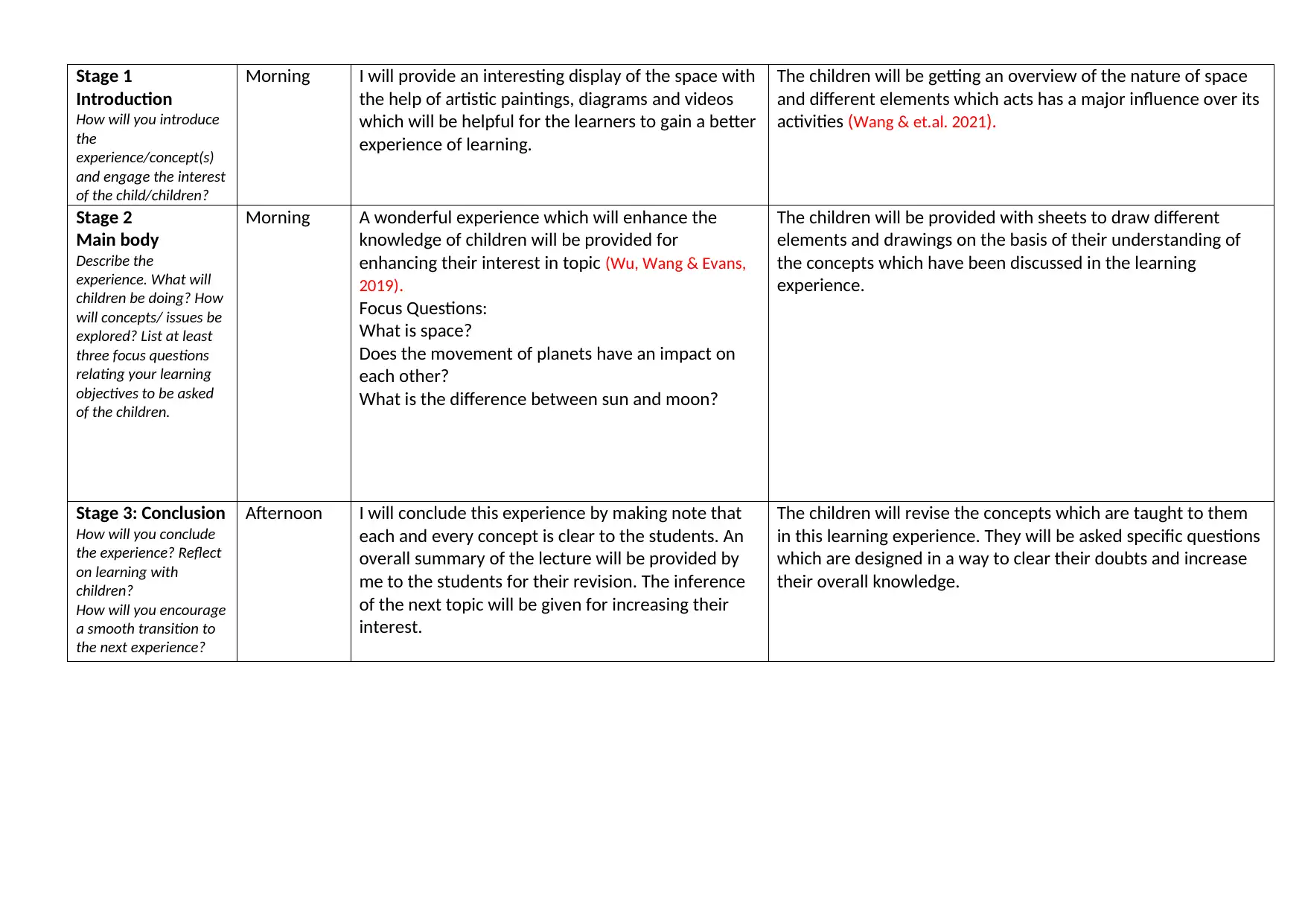
Stage 1
Introduction
How will you introduce
the
experience/concept(s)
and engage the interest
of the child/children?
Morning I will provide an interesting display of the space with
the help of artistic paintings, diagrams and videos
which will be helpful for the learners to gain a better
experience of learning.
The children will be getting an overview of the nature of space
and different elements which acts has a major influence over its
activities (Wang & et.al. 2021).
Stage 2
Main body
Describe the
experience. What will
children be doing? How
will concepts/ issues be
explored? List at least
three focus questions
relating your learning
objectives to be asked
of the children.
Morning A wonderful experience which will enhance the
knowledge of children will be provided for
enhancing their interest in topic (Wu, Wang & Evans,
2019).
Focus Questions:
What is space?
Does the movement of planets have an impact on
each other?
What is the difference between sun and moon?
The children will be provided with sheets to draw different
elements and drawings on the basis of their understanding of
the concepts which have been discussed in the learning
experience.
Stage 3: Conclusion
How will you conclude
the experience? Reflect
on learning with
children?
How will you encourage
a smooth transition to
the next experience?
Afternoon I will conclude this experience by making note that
each and every concept is clear to the students. An
overall summary of the lecture will be provided by
me to the students for their revision. The inference
of the next topic will be given for increasing their
interest.
The children will revise the concepts which are taught to them
in this learning experience. They will be asked specific questions
which are designed in a way to clear their doubts and increase
their overall knowledge.
Introduction
How will you introduce
the
experience/concept(s)
and engage the interest
of the child/children?
Morning I will provide an interesting display of the space with
the help of artistic paintings, diagrams and videos
which will be helpful for the learners to gain a better
experience of learning.
The children will be getting an overview of the nature of space
and different elements which acts has a major influence over its
activities (Wang & et.al. 2021).
Stage 2
Main body
Describe the
experience. What will
children be doing? How
will concepts/ issues be
explored? List at least
three focus questions
relating your learning
objectives to be asked
of the children.
Morning A wonderful experience which will enhance the
knowledge of children will be provided for
enhancing their interest in topic (Wu, Wang & Evans,
2019).
Focus Questions:
What is space?
Does the movement of planets have an impact on
each other?
What is the difference between sun and moon?
The children will be provided with sheets to draw different
elements and drawings on the basis of their understanding of
the concepts which have been discussed in the learning
experience.
Stage 3: Conclusion
How will you conclude
the experience? Reflect
on learning with
children?
How will you encourage
a smooth transition to
the next experience?
Afternoon I will conclude this experience by making note that
each and every concept is clear to the students. An
overall summary of the lecture will be provided by
me to the students for their revision. The inference
of the next topic will be given for increasing their
interest.
The children will revise the concepts which are taught to them
in this learning experience. They will be asked specific questions
which are designed in a way to clear their doubts and increase
their overall knowledge.
⊘ This is a preview!⊘
Do you want full access?
Subscribe today to unlock all pages.

Trusted by 1+ million students worldwide
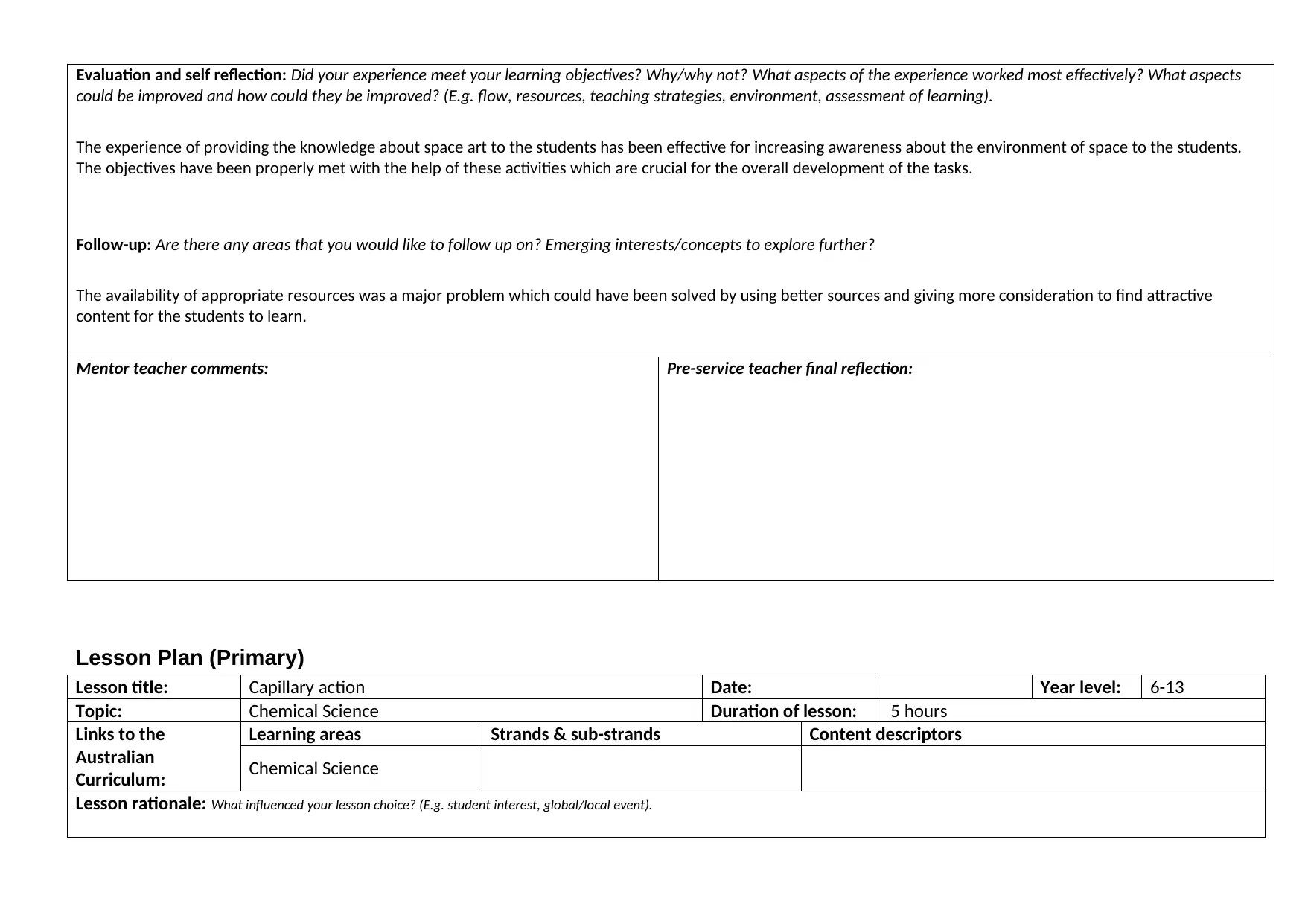
Evaluation and self reflection: Did your experience meet your learning objectives? Why/why not? What aspects of the experience worked most effectively? What aspects
could be improved and how could they be improved? (E.g. flow, resources, teaching strategies, environment, assessment of learning).
The experience of providing the knowledge about space art to the students has been effective for increasing awareness about the environment of space to the students.
The objectives have been properly met with the help of these activities which are crucial for the overall development of the tasks.
Follow-up: Are there any areas that you would like to follow up on? Emerging interests/concepts to explore further?
The availability of appropriate resources was a major problem which could have been solved by using better sources and giving more consideration to find attractive
content for the students to learn.
Mentor teacher comments: Pre-service teacher final reflection:
Lesson Plan (Primary)
Lesson title: Capillary action Date: Year level: 6-13
Topic: Chemical Science Duration of lesson: 5 hours
Links to the
Australian
Curriculum:
Learning areas Strands & sub-strands Content descriptors
Chemical Science
Lesson rationale: What influenced your lesson choice? (E.g. student interest, global/local event).
could be improved and how could they be improved? (E.g. flow, resources, teaching strategies, environment, assessment of learning).
The experience of providing the knowledge about space art to the students has been effective for increasing awareness about the environment of space to the students.
The objectives have been properly met with the help of these activities which are crucial for the overall development of the tasks.
Follow-up: Are there any areas that you would like to follow up on? Emerging interests/concepts to explore further?
The availability of appropriate resources was a major problem which could have been solved by using better sources and giving more consideration to find attractive
content for the students to learn.
Mentor teacher comments: Pre-service teacher final reflection:
Lesson Plan (Primary)
Lesson title: Capillary action Date: Year level: 6-13
Topic: Chemical Science Duration of lesson: 5 hours
Links to the
Australian
Curriculum:
Learning areas Strands & sub-strands Content descriptors
Chemical Science
Lesson rationale: What influenced your lesson choice? (E.g. student interest, global/local event).
Paraphrase This Document
Need a fresh take? Get an instant paraphrase of this document with our AI Paraphraser
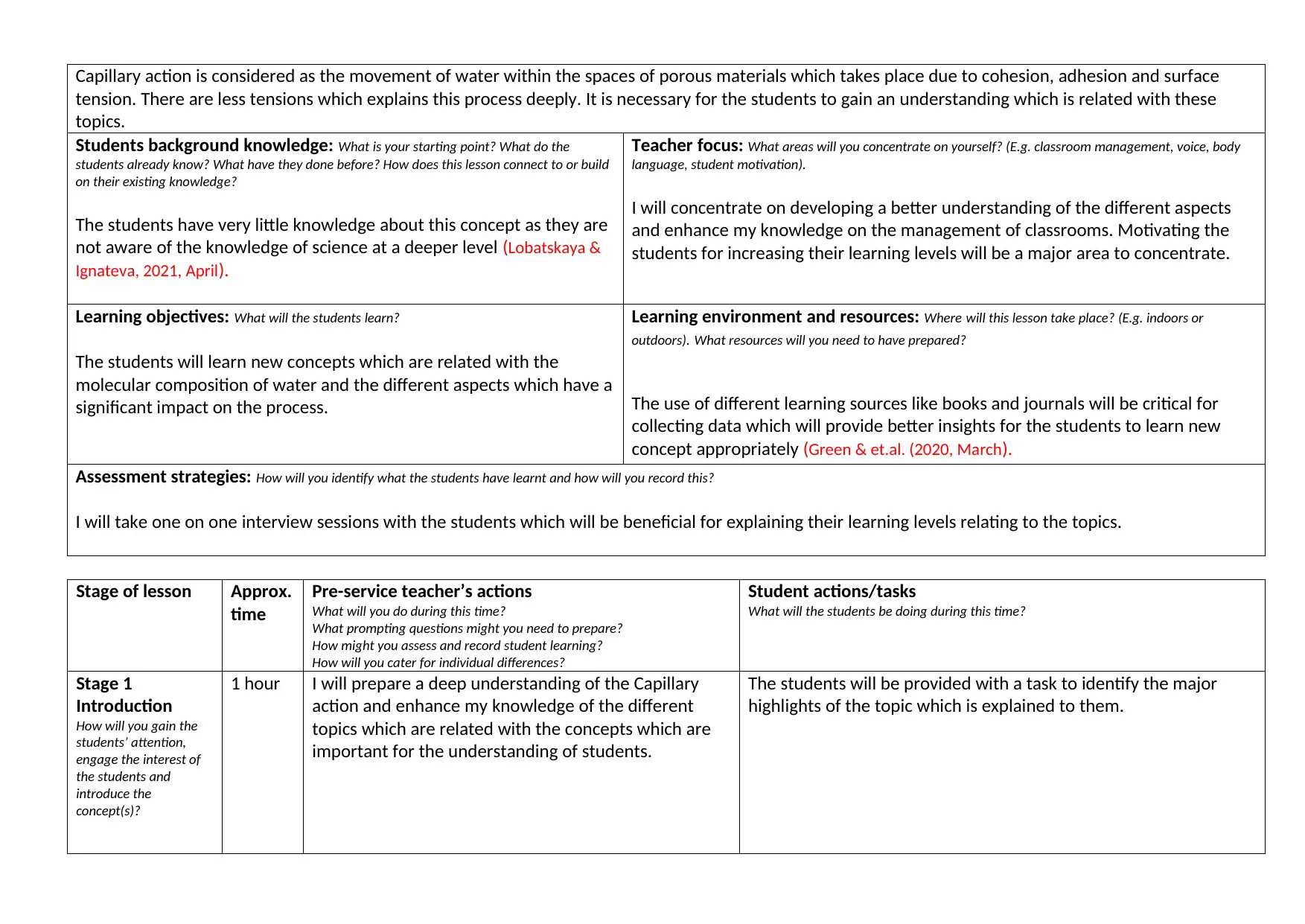
Capillary action is considered as the movement of water within the spaces of porous materials which takes place due to cohesion, adhesion and surface
tension. There are less tensions which explains this process deeply. It is necessary for the students to gain an understanding which is related with these
topics.
Students background knowledge: What is your starting point? What do the
students already know? What have they done before? How does this lesson connect to or build
on their existing knowledge?
The students have very little knowledge about this concept as they are
not aware of the knowledge of science at a deeper level (Lobatskaya &
Ignateva, 2021, April).
Teacher focus: What areas will you concentrate on yourself? (E.g. classroom management, voice, body
language, student motivation).
I will concentrate on developing a better understanding of the different aspects
and enhance my knowledge on the management of classrooms. Motivating the
students for increasing their learning levels will be a major area to concentrate.
Learning objectives: What will the students learn?
The students will learn new concepts which are related with the
molecular composition of water and the different aspects which have a
significant impact on the process.
Learning environment and resources: Where will this lesson take place? (E.g. indoors or
outdoors). What resources will you need to have prepared?
The use of different learning sources like books and journals will be critical for
collecting data which will provide better insights for the students to learn new
concept appropriately (Green & et.al. (2020, March).
Assessment strategies: How will you identify what the students have learnt and how will you record this?
I will take one on one interview sessions with the students which will be beneficial for explaining their learning levels relating to the topics.
Stage of lesson Approx.
time
Pre-service teacher’s actions
What will you do during this time?
What prompting questions might you need to prepare?
How might you assess and record student learning?
How will you cater for individual differences?
Student actions/tasks
What will the students be doing during this time?
Stage 1
Introduction
How will you gain the
students’ attention,
engage the interest of
the students and
introduce the
concept(s)?
1 hour I will prepare a deep understanding of the Capillary
action and enhance my knowledge of the different
topics which are related with the concepts which are
important for the understanding of students.
The students will be provided with a task to identify the major
highlights of the topic which is explained to them.
tension. There are less tensions which explains this process deeply. It is necessary for the students to gain an understanding which is related with these
topics.
Students background knowledge: What is your starting point? What do the
students already know? What have they done before? How does this lesson connect to or build
on their existing knowledge?
The students have very little knowledge about this concept as they are
not aware of the knowledge of science at a deeper level (Lobatskaya &
Ignateva, 2021, April).
Teacher focus: What areas will you concentrate on yourself? (E.g. classroom management, voice, body
language, student motivation).
I will concentrate on developing a better understanding of the different aspects
and enhance my knowledge on the management of classrooms. Motivating the
students for increasing their learning levels will be a major area to concentrate.
Learning objectives: What will the students learn?
The students will learn new concepts which are related with the
molecular composition of water and the different aspects which have a
significant impact on the process.
Learning environment and resources: Where will this lesson take place? (E.g. indoors or
outdoors). What resources will you need to have prepared?
The use of different learning sources like books and journals will be critical for
collecting data which will provide better insights for the students to learn new
concept appropriately (Green & et.al. (2020, March).
Assessment strategies: How will you identify what the students have learnt and how will you record this?
I will take one on one interview sessions with the students which will be beneficial for explaining their learning levels relating to the topics.
Stage of lesson Approx.
time
Pre-service teacher’s actions
What will you do during this time?
What prompting questions might you need to prepare?
How might you assess and record student learning?
How will you cater for individual differences?
Student actions/tasks
What will the students be doing during this time?
Stage 1
Introduction
How will you gain the
students’ attention,
engage the interest of
the students and
introduce the
concept(s)?
1 hour I will prepare a deep understanding of the Capillary
action and enhance my knowledge of the different
topics which are related with the concepts which are
important for the understanding of students.
The students will be provided with a task to identify the major
highlights of the topic which is explained to them.
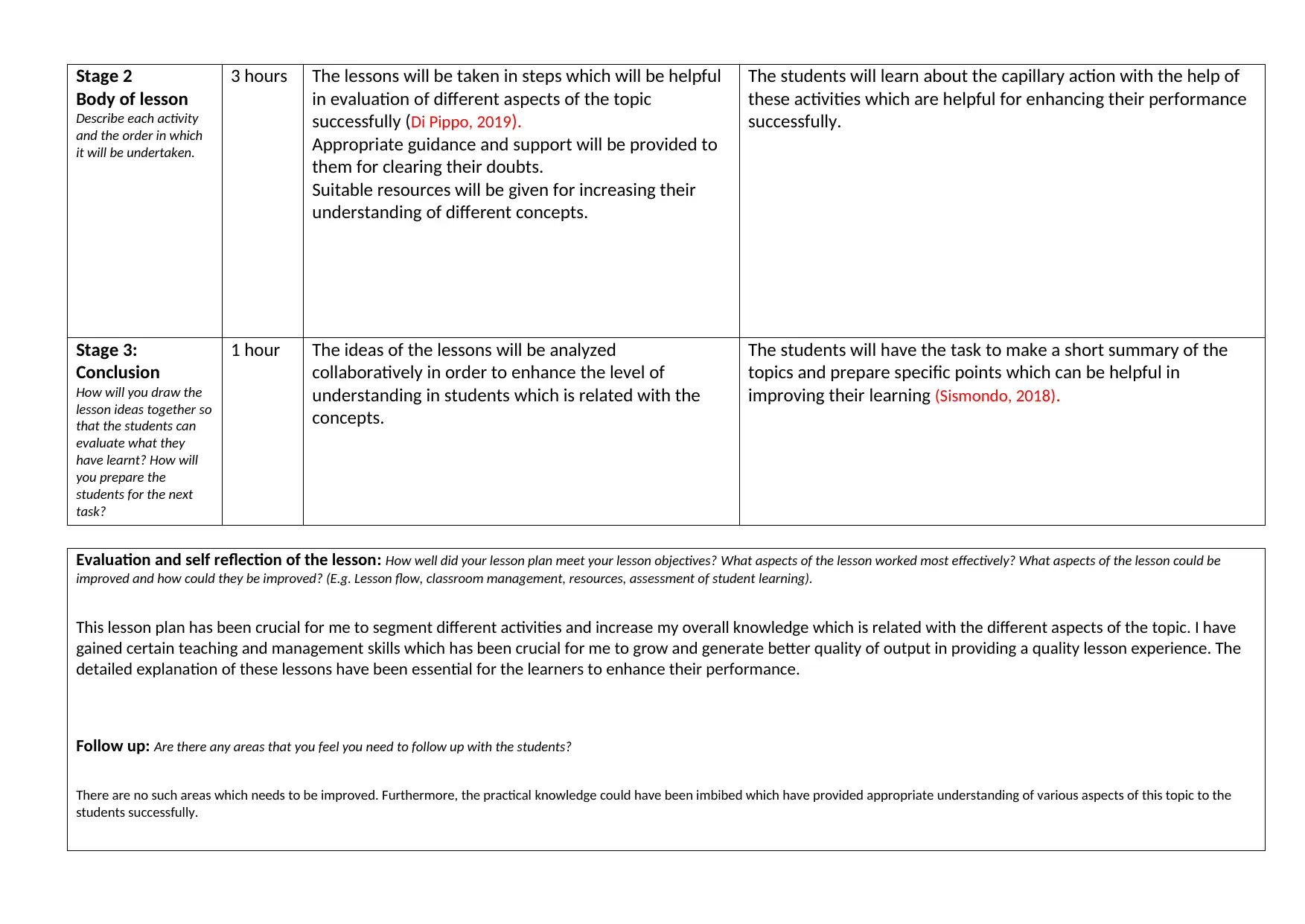
Stage 2
Body of lesson
Describe each activity
and the order in which
it will be undertaken.
3 hours The lessons will be taken in steps which will be helpful
in evaluation of different aspects of the topic
successfully (Di Pippo, 2019).
Appropriate guidance and support will be provided to
them for clearing their doubts.
Suitable resources will be given for increasing their
understanding of different concepts.
The students will learn about the capillary action with the help of
these activities which are helpful for enhancing their performance
successfully.
Stage 3:
Conclusion
How will you draw the
lesson ideas together so
that the students can
evaluate what they
have learnt? How will
you prepare the
students for the next
task?
1 hour The ideas of the lessons will be analyzed
collaboratively in order to enhance the level of
understanding in students which is related with the
concepts.
The students will have the task to make a short summary of the
topics and prepare specific points which can be helpful in
improving their learning (Sismondo, 2018).
Evaluation and self reflection of the lesson: How well did your lesson plan meet your lesson objectives? What aspects of the lesson worked most effectively? What aspects of the lesson could be
improved and how could they be improved? (E.g. Lesson flow, classroom management, resources, assessment of student learning).
This lesson plan has been crucial for me to segment different activities and increase my overall knowledge which is related with the different aspects of the topic. I have
gained certain teaching and management skills which has been crucial for me to grow and generate better quality of output in providing a quality lesson experience. The
detailed explanation of these lessons have been essential for the learners to enhance their performance.
Follow up: Are there any areas that you feel you need to follow up with the students?
There are no such areas which needs to be improved. Furthermore, the practical knowledge could have been imbibed which have provided appropriate understanding of various aspects of this topic to the
students successfully.
Body of lesson
Describe each activity
and the order in which
it will be undertaken.
3 hours The lessons will be taken in steps which will be helpful
in evaluation of different aspects of the topic
successfully (Di Pippo, 2019).
Appropriate guidance and support will be provided to
them for clearing their doubts.
Suitable resources will be given for increasing their
understanding of different concepts.
The students will learn about the capillary action with the help of
these activities which are helpful for enhancing their performance
successfully.
Stage 3:
Conclusion
How will you draw the
lesson ideas together so
that the students can
evaluate what they
have learnt? How will
you prepare the
students for the next
task?
1 hour The ideas of the lessons will be analyzed
collaboratively in order to enhance the level of
understanding in students which is related with the
concepts.
The students will have the task to make a short summary of the
topics and prepare specific points which can be helpful in
improving their learning (Sismondo, 2018).
Evaluation and self reflection of the lesson: How well did your lesson plan meet your lesson objectives? What aspects of the lesson worked most effectively? What aspects of the lesson could be
improved and how could they be improved? (E.g. Lesson flow, classroom management, resources, assessment of student learning).
This lesson plan has been crucial for me to segment different activities and increase my overall knowledge which is related with the different aspects of the topic. I have
gained certain teaching and management skills which has been crucial for me to grow and generate better quality of output in providing a quality lesson experience. The
detailed explanation of these lessons have been essential for the learners to enhance their performance.
Follow up: Are there any areas that you feel you need to follow up with the students?
There are no such areas which needs to be improved. Furthermore, the practical knowledge could have been imbibed which have provided appropriate understanding of various aspects of this topic to the
students successfully.
⊘ This is a preview!⊘
Do you want full access?
Subscribe today to unlock all pages.

Trusted by 1+ million students worldwide
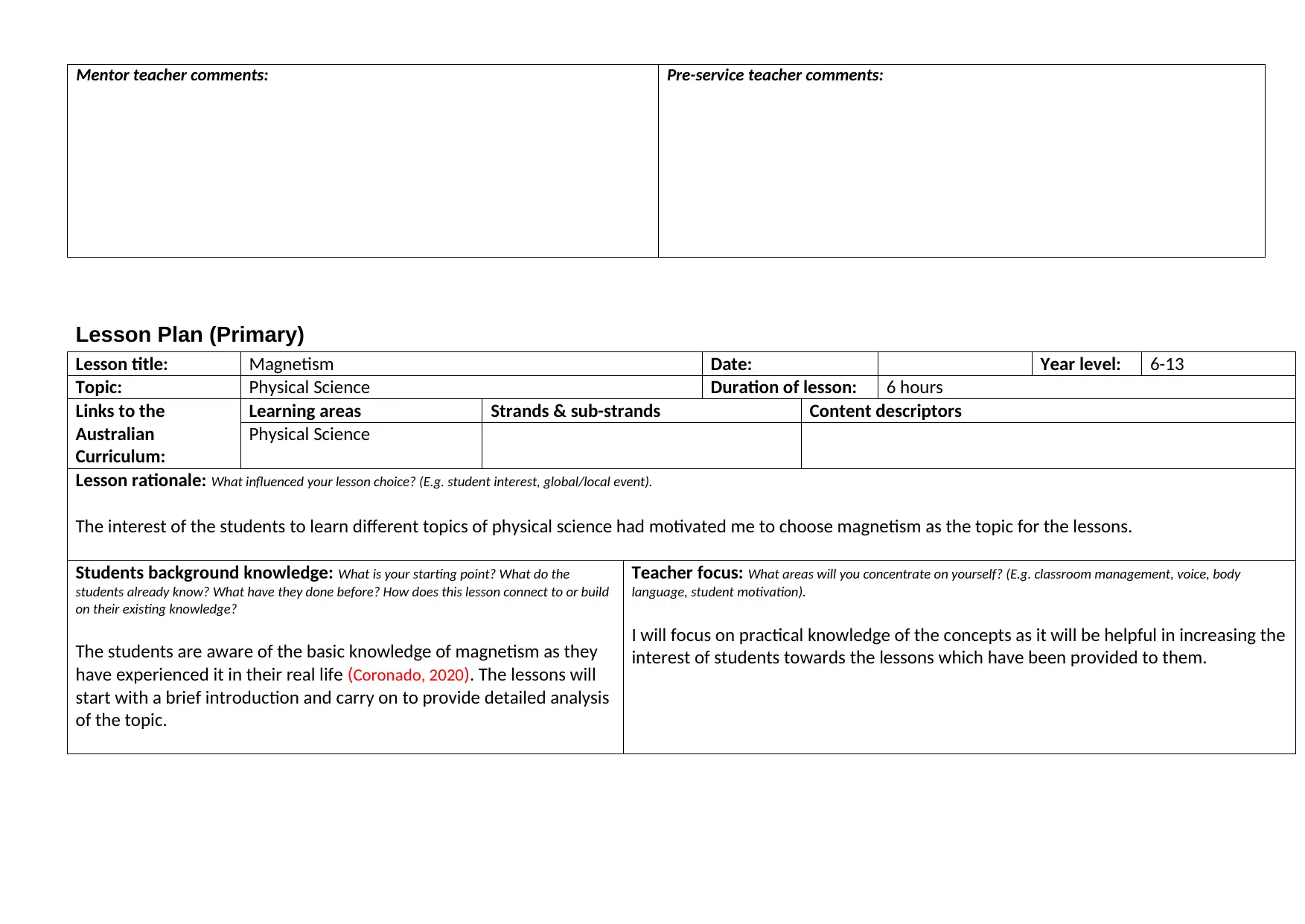
Mentor teacher comments: Pre-service teacher comments:
Lesson Plan (Primary)
Lesson title: Magnetism Date: Year level: 6-13
Topic: Physical Science Duration of lesson: 6 hours
Links to the
Australian
Curriculum:
Learning areas Strands & sub-strands Content descriptors
Physical Science
Lesson rationale: What influenced your lesson choice? (E.g. student interest, global/local event).
The interest of the students to learn different topics of physical science had motivated me to choose magnetism as the topic for the lessons.
Students background knowledge: What is your starting point? What do the
students already know? What have they done before? How does this lesson connect to or build
on their existing knowledge?
The students are aware of the basic knowledge of magnetism as they
have experienced it in their real life (Coronado, 2020). The lessons will
start with a brief introduction and carry on to provide detailed analysis
of the topic.
Teacher focus: What areas will you concentrate on yourself? (E.g. classroom management, voice, body
language, student motivation).
I will focus on practical knowledge of the concepts as it will be helpful in increasing the
interest of students towards the lessons which have been provided to them.
Lesson Plan (Primary)
Lesson title: Magnetism Date: Year level: 6-13
Topic: Physical Science Duration of lesson: 6 hours
Links to the
Australian
Curriculum:
Learning areas Strands & sub-strands Content descriptors
Physical Science
Lesson rationale: What influenced your lesson choice? (E.g. student interest, global/local event).
The interest of the students to learn different topics of physical science had motivated me to choose magnetism as the topic for the lessons.
Students background knowledge: What is your starting point? What do the
students already know? What have they done before? How does this lesson connect to or build
on their existing knowledge?
The students are aware of the basic knowledge of magnetism as they
have experienced it in their real life (Coronado, 2020). The lessons will
start with a brief introduction and carry on to provide detailed analysis
of the topic.
Teacher focus: What areas will you concentrate on yourself? (E.g. classroom management, voice, body
language, student motivation).
I will focus on practical knowledge of the concepts as it will be helpful in increasing the
interest of students towards the lessons which have been provided to them.
Paraphrase This Document
Need a fresh take? Get an instant paraphrase of this document with our AI Paraphraser
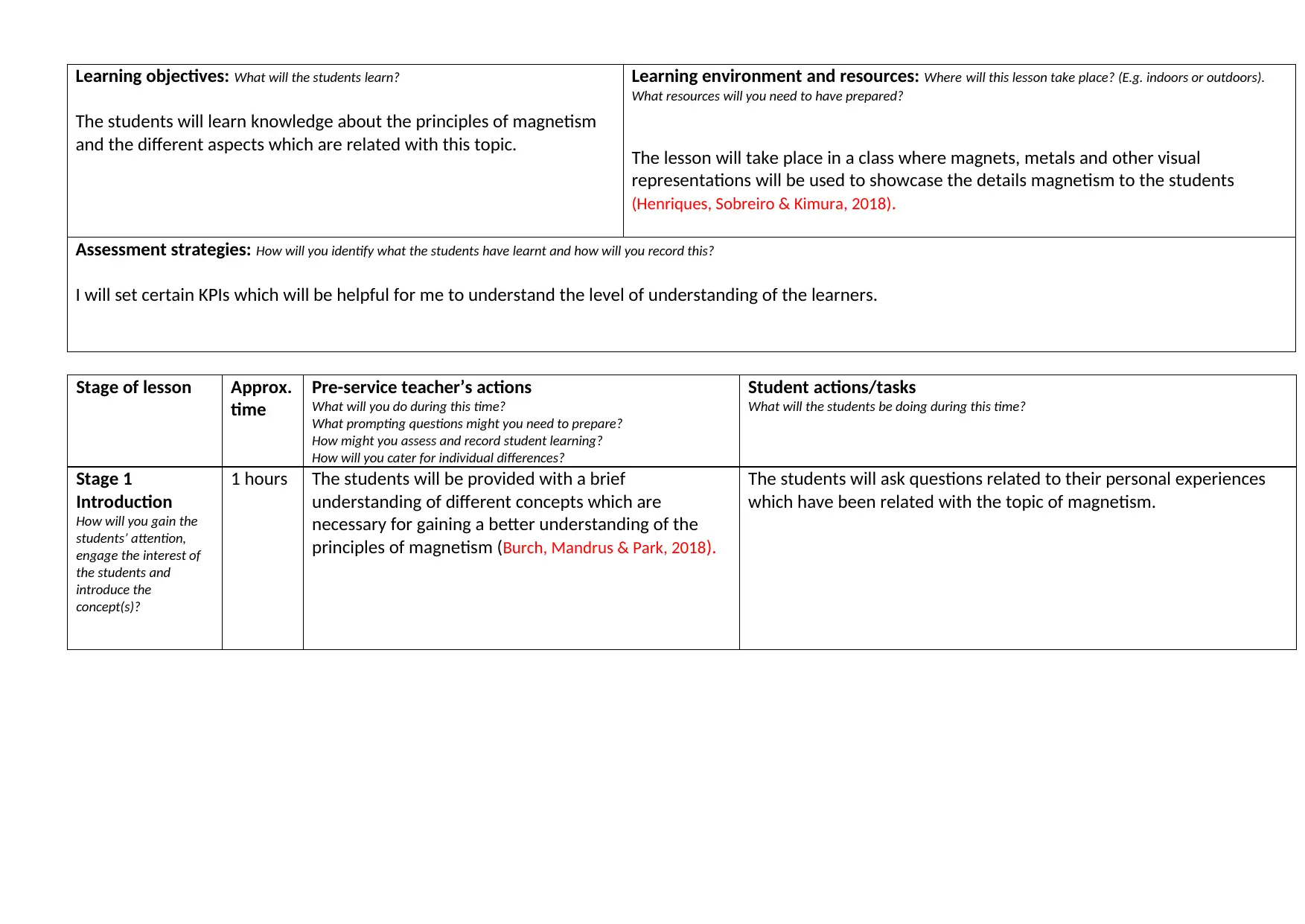
Learning objectives: What will the students learn?
The students will learn knowledge about the principles of magnetism
and the different aspects which are related with this topic.
Learning environment and resources: Where will this lesson take place? (E.g. indoors or outdoors).
What resources will you need to have prepared?
The lesson will take place in a class where magnets, metals and other visual
representations will be used to showcase the details magnetism to the students
(Henriques, Sobreiro & Kimura, 2018).
Assessment strategies: How will you identify what the students have learnt and how will you record this?
I will set certain KPIs which will be helpful for me to understand the level of understanding of the learners.
Stage of lesson Approx.
time
Pre-service teacher’s actions
What will you do during this time?
What prompting questions might you need to prepare?
How might you assess and record student learning?
How will you cater for individual differences?
Student actions/tasks
What will the students be doing during this time?
Stage 1
Introduction
How will you gain the
students’ attention,
engage the interest of
the students and
introduce the
concept(s)?
1 hours The students will be provided with a brief
understanding of different concepts which are
necessary for gaining a better understanding of the
principles of magnetism (Burch, Mandrus & Park, 2018).
The students will ask questions related to their personal experiences
which have been related with the topic of magnetism.
The students will learn knowledge about the principles of magnetism
and the different aspects which are related with this topic.
Learning environment and resources: Where will this lesson take place? (E.g. indoors or outdoors).
What resources will you need to have prepared?
The lesson will take place in a class where magnets, metals and other visual
representations will be used to showcase the details magnetism to the students
(Henriques, Sobreiro & Kimura, 2018).
Assessment strategies: How will you identify what the students have learnt and how will you record this?
I will set certain KPIs which will be helpful for me to understand the level of understanding of the learners.
Stage of lesson Approx.
time
Pre-service teacher’s actions
What will you do during this time?
What prompting questions might you need to prepare?
How might you assess and record student learning?
How will you cater for individual differences?
Student actions/tasks
What will the students be doing during this time?
Stage 1
Introduction
How will you gain the
students’ attention,
engage the interest of
the students and
introduce the
concept(s)?
1 hours The students will be provided with a brief
understanding of different concepts which are
necessary for gaining a better understanding of the
principles of magnetism (Burch, Mandrus & Park, 2018).
The students will ask questions related to their personal experiences
which have been related with the topic of magnetism.
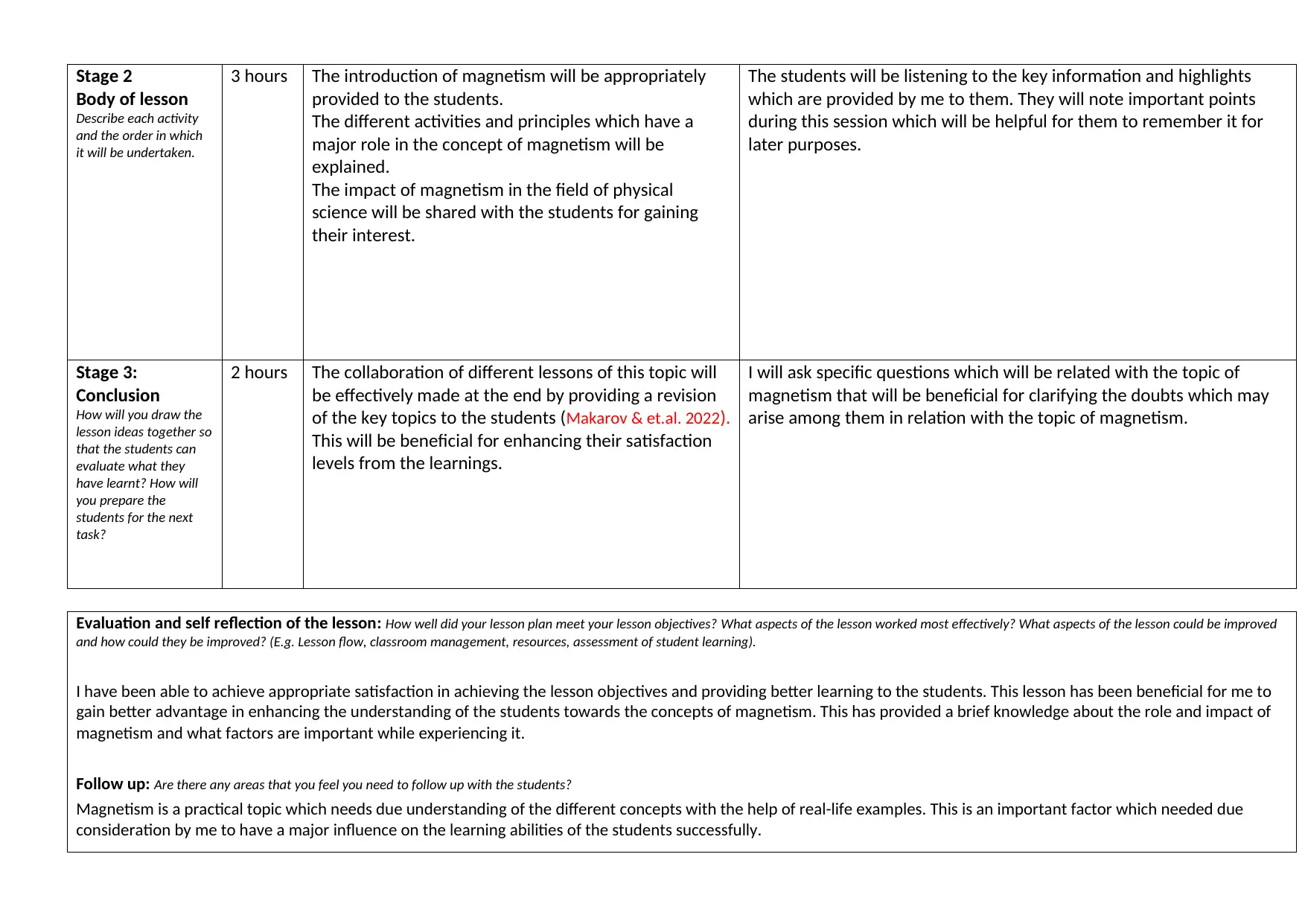
Stage 2
Body of lesson
Describe each activity
and the order in which
it will be undertaken.
3 hours The introduction of magnetism will be appropriately
provided to the students.
The different activities and principles which have a
major role in the concept of magnetism will be
explained.
The impact of magnetism in the field of physical
science will be shared with the students for gaining
their interest.
The students will be listening to the key information and highlights
which are provided by me to them. They will note important points
during this session which will be helpful for them to remember it for
later purposes.
Stage 3:
Conclusion
How will you draw the
lesson ideas together so
that the students can
evaluate what they
have learnt? How will
you prepare the
students for the next
task?
2 hours The collaboration of different lessons of this topic will
be effectively made at the end by providing a revision
of the key topics to the students (Makarov & et.al. 2022).
This will be beneficial for enhancing their satisfaction
levels from the learnings.
I will ask specific questions which will be related with the topic of
magnetism that will be beneficial for clarifying the doubts which may
arise among them in relation with the topic of magnetism.
Evaluation and self reflection of the lesson: How well did your lesson plan meet your lesson objectives? What aspects of the lesson worked most effectively? What aspects of the lesson could be improved
and how could they be improved? (E.g. Lesson flow, classroom management, resources, assessment of student learning).
I have been able to achieve appropriate satisfaction in achieving the lesson objectives and providing better learning to the students. This lesson has been beneficial for me to
gain better advantage in enhancing the understanding of the students towards the concepts of magnetism. This has provided a brief knowledge about the role and impact of
magnetism and what factors are important while experiencing it.
Follow up: Are there any areas that you feel you need to follow up with the students?
Magnetism is a practical topic which needs due understanding of the different concepts with the help of real-life examples. This is an important factor which needed due
consideration by me to have a major influence on the learning abilities of the students successfully.
Body of lesson
Describe each activity
and the order in which
it will be undertaken.
3 hours The introduction of magnetism will be appropriately
provided to the students.
The different activities and principles which have a
major role in the concept of magnetism will be
explained.
The impact of magnetism in the field of physical
science will be shared with the students for gaining
their interest.
The students will be listening to the key information and highlights
which are provided by me to them. They will note important points
during this session which will be helpful for them to remember it for
later purposes.
Stage 3:
Conclusion
How will you draw the
lesson ideas together so
that the students can
evaluate what they
have learnt? How will
you prepare the
students for the next
task?
2 hours The collaboration of different lessons of this topic will
be effectively made at the end by providing a revision
of the key topics to the students (Makarov & et.al. 2022).
This will be beneficial for enhancing their satisfaction
levels from the learnings.
I will ask specific questions which will be related with the topic of
magnetism that will be beneficial for clarifying the doubts which may
arise among them in relation with the topic of magnetism.
Evaluation and self reflection of the lesson: How well did your lesson plan meet your lesson objectives? What aspects of the lesson worked most effectively? What aspects of the lesson could be improved
and how could they be improved? (E.g. Lesson flow, classroom management, resources, assessment of student learning).
I have been able to achieve appropriate satisfaction in achieving the lesson objectives and providing better learning to the students. This lesson has been beneficial for me to
gain better advantage in enhancing the understanding of the students towards the concepts of magnetism. This has provided a brief knowledge about the role and impact of
magnetism and what factors are important while experiencing it.
Follow up: Are there any areas that you feel you need to follow up with the students?
Magnetism is a practical topic which needs due understanding of the different concepts with the help of real-life examples. This is an important factor which needed due
consideration by me to have a major influence on the learning abilities of the students successfully.
⊘ This is a preview!⊘
Do you want full access?
Subscribe today to unlock all pages.

Trusted by 1+ million students worldwide
1 out of 14
Related Documents
Your All-in-One AI-Powered Toolkit for Academic Success.
+13062052269
info@desklib.com
Available 24*7 on WhatsApp / Email
![[object Object]](/_next/static/media/star-bottom.7253800d.svg)
Unlock your academic potential
Copyright © 2020–2026 A2Z Services. All Rights Reserved. Developed and managed by ZUCOL.




